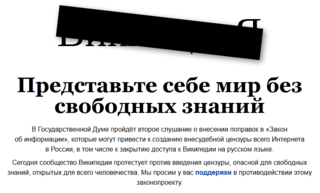Imagine a world without free speech - Russia debates rules
Access to the Russian-language Wikipedia is disabled across almost all its pages on Tuesday, July 10, due to the Russian parliament, the Duma, debating amendments to the law “About information” which may lead to censorship of Runet through blacklisting and filtering of internet sites.
The proposed bill aims to creating a blacklist of internet sites alleged to host child pornography, drug related material, extremist material and other content illegal in the country. It also proposed several other changes in the law, including holding providers of telecommunication services liable for failing to protect children.
Critics, including Google, Yahoo, search engine Yandex and social networking site Vkontakte noted that as-written the legislation contained many technical faults likely to negatively impact legitimate internet use. In protest, the Russian Wikipedia community decided upon a near-total blackout of contents on July 10. The blackout banner includes the text: “Imagine a world without free knowledge”, and summarises the details of the bill. Readers are warned that articles, such as Suicide, may be considered “harmful” due to ambiguity in the proposed legislation, risking a block of the entire website by Russia-based Internet providers.
Later in the day, the popular blogging platform LiveJournal issued a statement similarly opposed to the legislation: “[…Livejournal] considers the introduction of any restrictions on freedom of expression and information in the Internet to be unacceptable.”
The announcement by the Russian Wikimedia community states:
“Wikipedia in Russian will be closed on July 10th because of the Russian parliament’s debate on amendments to the law «About information» that could create real censorship of the internet — a blacklisting and filtering of internet sites. Supporters of the law proposed say that it is aimed only at widely prohibited content such as child pornography and «information like this», but conditions for determining the content falling under this law will create a thing like the «great Chinese firewall». The existing Russian law’s practice shows the high possibility of the worst scenario, in which access to Wikipedia soon will be closed in the country.
On July 11 the second reading of the law in the State Duma will take place. The law will come into force after the third reading, for which a date has not yet been set. ”
In January, the English-language Wikipedia ran a similar ‘blackout protest’ for 24 hours, protesting US anti-piracy laws the Stop Online Piracy Act and PROTECT IP Act (PIPA). That action resulted in those laws being reconsidered. An earlier blackout, in October last year, saw the Italian Wikipedia community successfully oppose other Internet censorship legislation.
Speaking to Wikinews in January, the Wikimedia Foundation’s chief executive, Sue Gardner, explained “[t]he Wikimedia movement does not have a lot of experience with advocacy, and probably mistakes will get made. At this time the Wikimedia Foundation doesn’t have any plans to develop policy governing protests or advocacy work. But, I think it probably does make sense for the Foundation to create venues for these discussions”.


























Comments